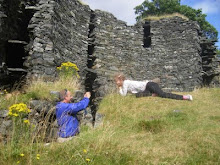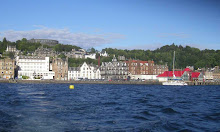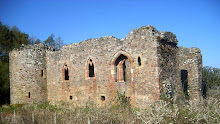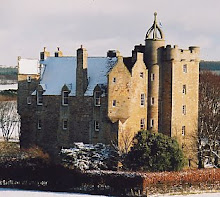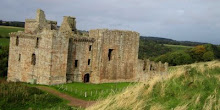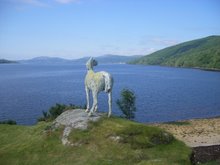 |
| Doune Castle |
Visitors
to the very fine Doune Castle will learn that it was built
by Robert, Duke of Albany. Robert was the first person to own this enigmatic title
which, unusually, has no relationship with any land. It was later given to the
sons of kings prior to succeeding, or to younger sons (the best available title
short of king). Other Dukes of Albany were Henry Lord Darnley, husband of Mary
Queen of Scots, Charles I and James II.
 |
| The last Duke of Albany |
Queen
Victoria’s youngest son, Prince Leopold was created Duke of Albany in 1881, but
was a haemophiliac and died aged 30. His son, Charles Edward, also reigning duke
of Saxe-Coburg and Gotha, was deprived of his British peerages and honours for having fought in the German Army (eventually as a general) during
WWI.
‘Albany’
comes from the Celtic word Alba, the island of Great Britain as opposed
to Ierne, Ireland. When the southern part of Britain became Anglo-Saxon,
the name settled on the Celtic lands north of the Forth and Clyde. Today it
means Scotland and at the Scottish border you’ll see Fàilte gu
Alba, Welcome to Scotland.
‘Albany’
is the Anglo-Saxon rendering of Alba (Cf. Brittany, Saxony, Lombardy). The
title was first created in 1398 for the said
Robert Stewart, builder of Doune Castle, second son of King Robert II, who was a ruthless Regent for three
Scottish kings - his father, brother and nephew - who for various reasons were unable
to rule effectively.
 |
| Charlotte, Duchess of Albany |
‘Bonnie
Prince Charlie’ latterly styled himself ‘Count of Albany’ and Charlotte, his
daughter by Clementina Walkinshaw, was titled Duchess of Albany in the Jacobite
Peerage. Charlotte herself had three illegitimate children, two girls and
a son, Charles Edward, who became an officer in the
Russian army. He told such tall tales of his origins and adventures that few
believed his claims to royal descent until the 20th century when it was established
that he was indeed who he had claimed to be. He died in 1854 as the result of a
coach accident near Stirling Castle and is buried at Dunkeld Cathedral, where his grave can still be seen. He married twice
but had no children.
But that, apparently, is not the end of the Duchy
of Albany. At least not according to His Royal Highness Prince Michael of
Albany, who styles himself 7th Duke of Albany due to his descent (6G
grandson) from Prince Charles Edward Stuart through Comtesse Marguerite o’Dea
d’Audibert de Lussan - not a familiar name to most. It’s a long story, told at
length by Prince Michael in his book ‘The Forgotten Monarchy of Scotland’,
available from Amazon in paperback £1.64p.











































